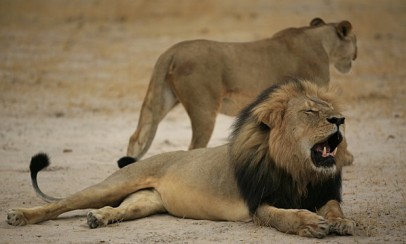To save lions like Cecil, let hunters have their way

Last month the Dallas Safari Club announced that one of its number had killed a black rhino in Namibia, one of four allotted for culling each year. The permit to do so had been auctioned for $350,000, which goes to the Namibian wildlife conservation service. Palmer paid $50,000 to kill Cecil, but who knows where that went.
The morality of a concern for someone else’s wildlife is curious. If Africa’s elephants became extinct – which is unlikely – I would certainly be sorry, but on the scale of global misery I am not sure how sorry. What would be crazy would be for it to happen because of the policies of those purporting to save them.
Huffing and puffing against the ivory trade is an international sanction against poor countries. Their seized ivory hoards are regularly burned “to send a message”, which is like burning their gold reserves. Steinway pianos with ivory keys are denied export licences. Britain’s royal princes promise to eliminate ivory from their palaces. In 2014 a “London declaration” saw diplomats and celebrities pledge an “end to corruption, and tougher penalties” for ivory traders. An exultant foreign secretary, William Hague, said “we have begun to turn the tide”.
This is patronising nonsense. Britain does not rule Africa any more. Partly thanks to the ban on open ivory sales, rhino horn fetches £50,000 a kilo in China and Vietnam and traders have grown very rich. According to the US Fish and Wildlife Service, the ban has seen business grow from a few hundred million dollars to about $10bn last year. This is policy at its most counter-productive.
The only way to stem the trade, as with drugs, is to stem demand. There has been some success in Japan, but not in the market overall. Where there has been modest success in protecting animals, notably in South Africa and its neighbours, it has come from exploiting the market, from turning poachers literally into gamekeepers, usually financed by trophy hunting.
Namibia’s conservation programme depends heavily on hunting, which earns it some $25m and reportedly contributes £130m a year to African conservation as a whole. Two years ago Tanzania’s director of wildlife, Alexander Songorwa, pleaded with Cites not to list his lions as endangered “on behalf of my country and all our wildlife”. Lions were his budget.
International agencies and their lobbyists have a vested interest in pretending that curbing supply works. It keeps them in with governments, gives them a tough image and “raises awareness”, especially with politicians and fundraisers. It clearly does not save elephants or rhinos.
Occasional visits to African game reserves have convinced me the entire continent cannot be made a militarised safari park. Such are the rewards to poaching that many African politicians are deeply involved. The height of absurdity has been reached in Kenya, where a herculean effort is being made to guard a “last” elderly northern white rhino. It actually arrived in 2009 from a Czech zoo. Only its semen seems likely to survive. Since Vietnamese traders would pay a quarter of a million dollars for its horn, it is hard to see why the Czechs cannot just help Vietnam breed its own rhinos.
Two decades ago, the American writer Raymond Bonner wrote his controversial attack on the African wildlife lobby, At the Hand of Man. All he wrote has turned out true, though what riled his critics was his revelation of the politics of the wildlife movement preceding the ivory ban. After years of study, Bonner concluded that the only sure way of preserving Africa’s mega-species was to allow communities to profit from their survival, to have an interest in guarding them when alive and harvesting their carcasses when dead.
This so called sustainable ranching is broadly the approach now prevailing with some success in southern African states. But to turn the continent from poaching to conserving depends not just on hunting. It depends on money from selling the ivory, legally traded from controlled culls, not left to criminals and their political allies. South Africa still loses over 1,000 rhinos a year to poachers.
Flooding the ivory market may stick in many a throat, but it may diminish the value the Chinese place on the product, or perhaps at least lead the Chinese to breed their own elephants and rhinos. A rare success of Cites has been in the recovery of crocodiles by managing the market for their skins.
As it is, Africans must endure lectures from British royals on how to run their countries, which is not a good idea. Britain’s continued support for the ivory ban does not work. It merely ensures that dead rhinos and elephants are more valuable than living ones. That way lies disaster.
















